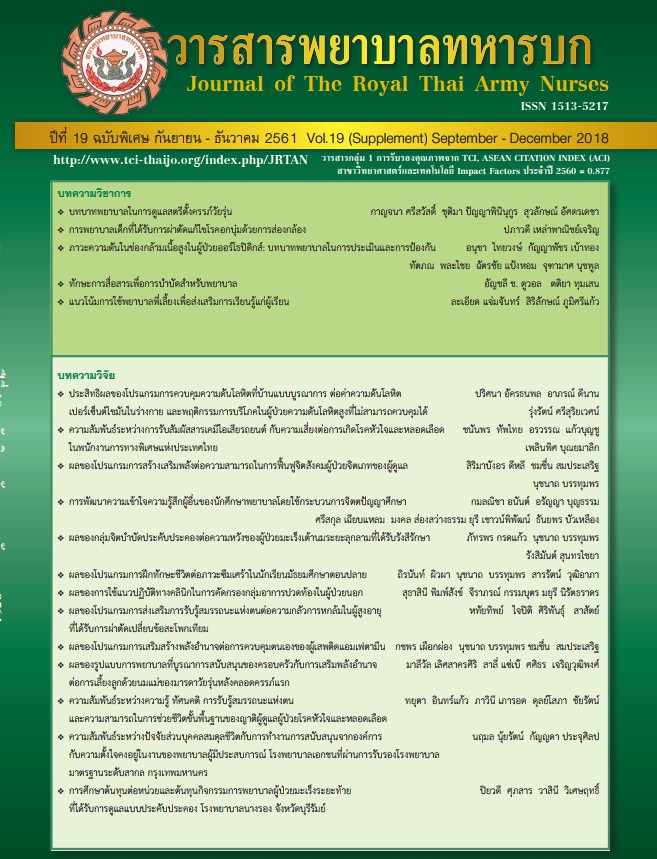Effect of Individual Supportive Psychotherapy on Stress in Family Members of Surgical Intensive Care Unit Patients
Keywords:
Individual Supportive Psychotherapy, Stress, Family Members of Surgical Intensive Care Unit PatientsAbstract
The purpose of this quasi-experimental study was to examine the effect of individual Supportive psychotherapy on stress in family members of surgical intensive care unit patients. The sample included twenty family members of crisis patients from surgical intensive care unit patients in Ramathibodi hospital who met the inclusion criteria. The participants were randomly assigned into the experimental and control group, 10 for each group. The experimental group received individual supportive psychotherapy for 5 sessions within 5 days and each session took about 60 to 90 minutes. Whereas those in the control group received only routine nursing care. The stress in family members of crisis patients questionnaire was used to collect data at pretest and posttest. Descriptive statistics, independent t-test and pair t-test were employed for data analysis. Study results revealed that experimental group had significantly lower mean scores of stress at posttest than that of control group (p < .001). In experimental group, there was significantly lower mean score of stress at posttest than pretest (p < .001). From the results, it showed that the individual supportive psychotherapy could reduce stress among family members of surgical intensive care unit patients. Therefore, nurses and related health personnel could apply this individual supportive psychotherapy in order to reduce stress among family members of crisis patients in other intensive care unit patients.
Downloads
References
2. Kusoom V. Critical Care Nursing: A Holistic Approach (5th ed.). Bangkok: Sahaprachapanit; 2013. (in Thai).
3. Sattayatham C. Psychiatric and Mental Health Nursing (Revised edition) Volume 1 (1st ed.). Bangkok: Thana Place Co.,Ltd.; 2013. (in Thai).
4. McAdam JL, Dracup KA, White DB, Fontaine DK, & Puntillo KL. Symptom experiences of familymembers of intensive care unit patient at high risk for dying. Critical Care Medicine. 2010;38(4): 1078-1085.
5. Aguilera DC. Crisis intervention: Theory and methodology (8th ed.). St. Louis: C. V. Mosby; 1988.
6. Sawasdinaruenart S. Effects of Information and Emotional support Program on Caregivers Stress and Stress Impacts in Caring for Patients with Traumatic Brain Injury in Critical Phase(Master’s thesis). Prince of Songkla University; 2012. (in Thai).
7. Pomrod T. Responses to Need and Coping to Stress of Patients’ Relatives before Transferring from the Intensive Care Unit. Ramathibodi Nursing Jounal. 2012; 17(1): 75-89. (in Thai).
8. Lhaosupab N. Effect of Stress Management Program for Relatives’ of Critically Ill Patients on Relatives Stress (Master’s thesis). Mahidol University; 2013. (in Thai).
9. Singdong P. Caring for Relatives of Critically Ill Patients: Relatives’ Perspective. Princess of Naradhiwas University Jounal. 2011; 3(3): 17-32. (in Thai).
10. Watthanasereewetch T. The Effect of Providing Concrete-Objective Information Before the First Visit to Pediatric Patients in Intensive Care Unit on Maternal Anxiety. Journal of The Royal Thai Army Nurses. 2017; 18(3): 91-99. (in Thai).
11. Wilkins P. Person-centred and Experiential Therapies: Contemporary Approaches And Issues inPractice. SAGE; 2016.
12. Lazarus RS & Folkman S. Stress appraisal and coping. New York: Springer; 1984.
13. Napapongsuriya T. Psychotherapy. Psychiatric Nursing (1st ed.). Nakhon Pathom: Amarin Printing & Publishing Public; 2014. (in Thai).
14. Ruchiwit M. The Effect of the One-to-One Interaction Process with Group Supportive Psychotherapy on Levels of Hope, Anxiety, and Self-care Practice for Patients that had Experienced Organ Loss. Pathum Thani: Thammasat Printing House; 2013. (in Thai).
15. Wongkrai B. The Effect of Family Needs Supporting Program on Adjustment of Family Members of Patients with Traumatic Brain Injury. Journal of Nursing Science Chulalongkorn University. 2010; 19(2): 86-97. (in Thai).
16. Yothinwattanabamrung A. The Effect of Family Crisis Intervention Program on Adaptation of Family Members of Patients Admitted in an Intensive Care Unit. Journal of Nursing ScienceChulalongkorn University. 2010; 19(2): 98-111. (in Thai).
17. Musigo S. Stress Reduction by Client-Centered Consult in Relative Psychiatric Patients in Suansaranrom Hospital (Master’s thesis). Suratthani Rajabhat University; 2011. (in Thai).
Downloads
Published
How to Cite
Issue
Section
License
บทความหรือข้อคิดเห็นใดใดที่ปรากฏในวารสารพยาบาลทหารบกเป็นวรรณกรรมของผู้เขียน ซึ่งบรรณาธิการหรือสมาคมพยาบาลทหารบก ไม่จำเป็นต้องเห็นด้วย
บทความที่ได้รับการตีพิมพ์เป็นลิขสิทธิ์ของวารสารพยาบาลทหารบก
The ideas and opinions expressed in the Journal of The Royal Thai Army Nurses are those of the authors and not necessarily those
of the editor or Royal Thai Army Nurses Association.






